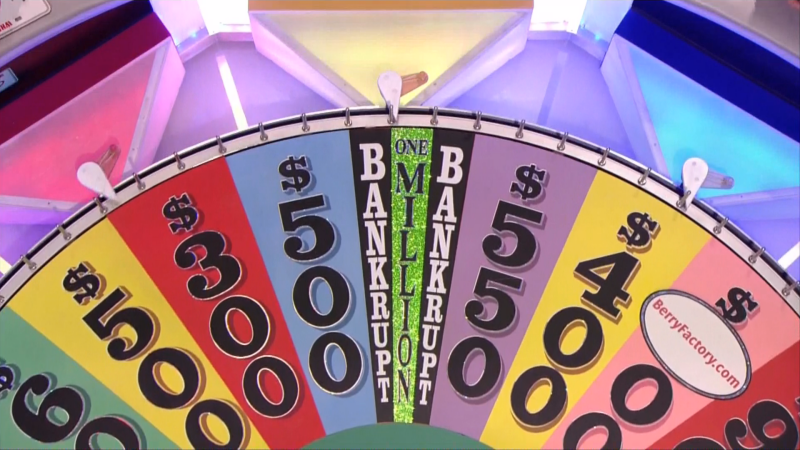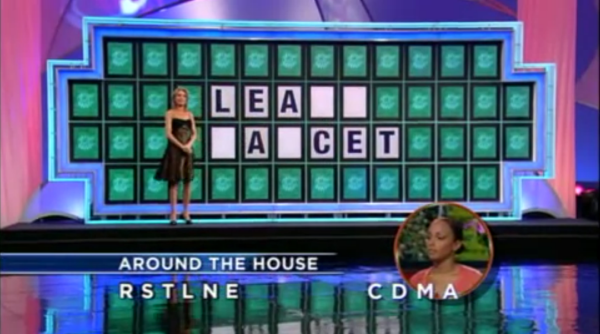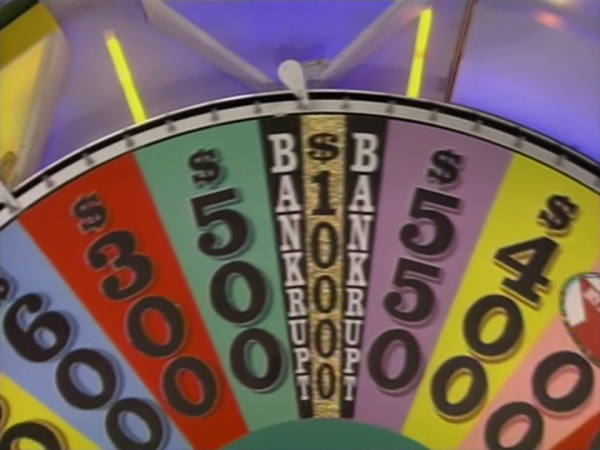No Spin Zone: Wheel of Fortune and the Million Dollar Set-up

Michelle Loewenstein became the first-ever Wheel of Fortune millionaire on October 14, 2008—a mere four days after her honeymoon and six weeks after the Million Dollar Wedge was first introduced. It was perfect timing: Wheel's new million-dollar fanfare was very much at its peak, Ms. Loewenstein—a young florist née teacher and newlywed from New Jersey—had just come home from Hawaii, and on the very first spin of the game1 and with a fresh field of letters Ms. Loewenstein landed on the sparkly wedge.
While the Million Dollar Wedge (MDW) has certainly added renewed spectacle and a much higher ceiling to the game, no one has won the million since Ms. Loewenstein and few others have even had the opportunity. Just how winnable is this million, and just how peculiar is Ms. Loewenstein's win? The odds are so low and her circumstances so peculiar that Michelle Loewenstein's million dollar game is in all likelihood a Sony Television Pictures2 creation.
A Closer Look
Such a bold claim requires some explanation! Before getting into the data, however, let's first take a look at the Path to Victory, or PtV, in winning a million dollars:
- Spin and land on the Million Dollar Wedge
- Guess a correct consonant
- Win that round
- Go the rest of the game without hitting a Bankrupt
- Finish the game with the most winnings (i.e. win the game)
- Spin the correct Bonus Round card
- Solve the Bonus Round puzzle
Unfortunately, the networks don't release any data whatsoever about _Wheel of Fortune_ (or any game show for that matter). Path to Victory steps 1, 3, 5, and 6 can all be mathematically assumed (more on that in a moment!) but steps 2, 4, and 7 present somewhat of a problem in requiring real-world data. With that in mind, I decided to watch 41 games4 and record the following set of data points as a representative5:
- Player and round
- Letter guessed
- If they guessed correctly
- Who won the round and each round's prize (in USD)
- If they spun the MDW
- If they spun a Bankrupt
- If the spin should be ignored (i.e. Pat's final spin)
This data serves to calculate the odds of guessing a letter correctly and how often players are spinning a Bankrupt in a given game. The remaining data that needs to be gathered are the odds of solving the Bonus Puzzle. For that, I used six years of historic data gathered from the The Wheel of Fortune Bonus Puzzle Compendium6, which can be seen in sheet "Bonus Rounds" of the spreadsheet.
Calculating the Odds
The probability calculations for each step in the PtV are defined as follows:
| Step | Formula | Probability |
|---|---|---|
| Odds of player spinning million (A) | 1 ÷ 72 × [valid spins per game] | 8.74% |
| Odds of guessing letter correctly (B) | from collected data | 86.55% |
| Odds of winning round (C) | 1 ÷ 3 | 33.33% |
| Odds of post-million Bankrupt (D) | from collected data | 5.91% |
| Odds of winning game (E) | 1 ÷ 3 | 33.33% |
| Odds of spinning $1M bonus card (F) | 1 ÷ 24 | 4.17% |
| Odds of solving bonus puzzle (G) | historic data used | 37.48 |
Before we calculate the final probability, I'd like to cover a few assumptions and calculations I made:
- The odds of winning the puzzle and the game are 1:3. I made no attempt to calculate the odds to win the round and game given any other factors. The main reason why I feel 1:3 is a valid assumption is because the game itself is subject to many random factors, and winning a big round (and thus the game) can happen at any moment.
- Valid spins per game is the average number of actual spins a singular player will make during a given game. Valid spins are any that occur in Rounds 1 through 3, are not vowel guesses, and are not part of Pat's final spin. As of this article's publishing, each player only actually takes and average of 6 of these "million possible" spins per game.
- The odds of a post-million Bankrupt are an attempt to calculate the likelihood of spinning a Bankrupt wedge *after* spinning the MDW (and thus losing the MDW). To calculate this we take the average number of Bankrupts from Rounds 1 through 3 and divide that number in half, assuming a 50/50 likelihood that you spin it after or before you actually hit the MDW. Then, we add on the odds of spinning a Bankrupt after Round 3.
- The odds of solving the bonus puzzle come from six years worth of historic data and thus can be assumed to be "complete".
The Grand Probability
With our table above, the final probability can be calculated using the formula:
A × B × C × (1 - D) × E × F × G
resulting in a final probability of:
0.012349%
That's about 1 in 8,098 players, 2,699 games, or every 13.8 years7!
The Grand Probability… With the Producers' Help
Throughout the course of this project I've made a few notable discoveries, all of which have led me to believe that the producers manufactured this million dollar win.
One obvious oddity regarding Ms. Loewenstein's victory is that it happened a mere 27 games after Wheel even debuted the MDW!
This is absolutely astonishing given the proposed 2,700-game average timespan for a million dollar game. While this may be attributed to common luck, it becomes much less likely when looking at the two variables the producers control and assuming foul play:
Odds of spinning $1M bonus card (F)
Odds of solving bonus puzzle (G)
For (F), Wheel could put Million Dollar Bonus Cards for all 24 cards in the Bonus Wheel very easily, with neither Ms. Loewenstein nor the audience the wiser. I'll cover (G) in the next section more thoroughly,but for now it can be assumed trivial for Wheel to issue a very easy Bonus Puzzle.
Removing (F) and (G) from our formula results in a final probability of:
0.790809%
That's about 1 in 126 players—or every 42 games!—much closer to the 27 game mark when Ms. Loewenstein won. The show merely controlling for (F) and (G) allows for much more mathematical sense.
The CDMA Assumption

How could the producers know that Ms. Loewenstein would solve the Bonus Puzzle, though? If she failed to solve this, it would be politically difficult for Wheel to orchestrate another contestant spinning one million dollars from the Bonus Wheel. She simply had to get a ridiculously easy one (see Figure 3).
First, Wheel of Fortune provides RSTLNE for the Bonus Puzzle right out of the gate. Applying these letters to Ms. Loewenstein's Bonus Puzzle, "Leaky Faucet", only yields:
L E _ _ _
_ _ _ _ E T
While this isn't immediately solvable, it still contains the beginning and ending letters of the phrase.
However, both Wheel-Watchers and a quick look at the underlying Bonus Puzzle data will tell you that CDMA (by far) represents the four most commonly selected Bonus Round letters8. Additionally, there are only 11 words in the English language ending in the suffix "cet"—only two of which would ever appear in a puzzle or ever be generally known by a contestant (i.e., "facet" and "faucet")9.
The Financial Gains

Finally, Wheel introduced the MDW to replace the $10,000 Wedge. As can be expected, this wedge had the same requirements to win as any other normal cash wedge:
- Spin the $10,000 Wedge
- Guess the correct consonant
- Win the round
The probability here is 2.521578%. That's about 1 in 40 players, or once every 13 games.
Now, if Wheel pays out $10,000 from this wedge once every 13 games that would mean the wedge has a cost per game (CPG) of $10,000 ÷ 13, or $769.23. The MDW, however, has a CPG of $1,000,000 ÷ 2,699, or $370.51.
The difference between these costs ($769.23 - $769.23) reveals the savings Wheel realizes each game upon switching to the MDW: an average of $398.72 every game. The peculiarity here grows when we extend these cost savings throughout the 2,699 game (or 13.8 years) timespan:
$398.72 × 2,699 = $1,076,145.28
By switching over from the $10,000 Wedge to the Million Dollar Wedge, Sony has effectively saved themselves more than $1,000,000 over the probabilistic estimate for each Million Dollar Winner!
Final Thoughts
Given the extremely low odds of winning $1 million, the speed with which Ms. Loewenstein won, the relative ease with which Sony may control the Bonus Wheel and Bonus Puzzle, and the hype and positive press Sony stood to gain from getting an early winner, it becomes much more likely that Sony did in fact fix the million dollar win from 2008.
This is pure speculation, however, and I have no actual evidence that Sony did anything that I'm claiming. I'm a huge fan of the show and I've loved watching and recording this game data — it was a lot of fun and I've grown to love Wheel and Wheel culture. I will more than likely continue recording more and more game data and updating the spreadsheet for a while.
Finally, I think Sony and other game show networks should release historical data (as much as possible) to allow hobbyists and fans to do interesting and fun things. There's so many insights that we can get from these games and having structured data would be fantastic!
Please feel free to leave comments below, and I would greatly appreciate any corrections or fixes if you've noticed anything from my analysis and spreadsheet calculations.
Special Thanks
A lot of work went into this analysis and I would like to thank:
- Cactus Bob for his unbelievably comprehensive Bonus Puzzle Compendium, and James E. Pettis at Wheel of Fortune Solutions10.
- The Buy a Vowel Boards userbase, for their incredible vigilance in record-keeping and providing public services like their weekly stat recaps11 12 and Wheel of Fortune History Wiki13.
References
- Article about Michelle Lowenstein's Win, ABC 7 NY
- Sony Pictures Television is the parent company that owns the rights to Wheel of Fortune, Web Archive
- Video of Michelle's winning game, YouTube
- I originally chose 40 as the number of games' data to collect. I felt like 40 games was more than enough to get the numbers I needed.
- Data collected, Google Spreadsheet
-
The Wheel of Fortune Bonus Puzzle Compendium,
CactusBob
Contains many years worth of historic Bonus Puzzle results - It should be noted that the final probability has been calculated using 41 games worth of data at the time of writing this. I will continue to add more game data to the spreadsheet in the future; however, the probabilities have not fluctuated very much at all after about 10-20 games' worth of data.
- Sheet "Letter Frequency" in the collected data spreadsheet shows a calculated letter frequency for the letters selected in the Bonus Round from 2007 through 2012. The letters "C", "D", "M", and "A" account for 57% of possible letters guessed.
- Possible words ending in CET, Scrabblefinder
-
Wheel of Fortune puzzle solutions,
James E. Pettis
A large collection of puzzles used in games over the years - Buy a Vowel Boards, A Wheel of Fortune Community
- Weekly stat recap, Buy a Vowel Boards
-
Wheel of Fortune History Wiki,
Wikia
Comprehensive wiki and historical resource covering all aspects of the game's colorful history.

Email me for now and I'll post your comment by hand :P